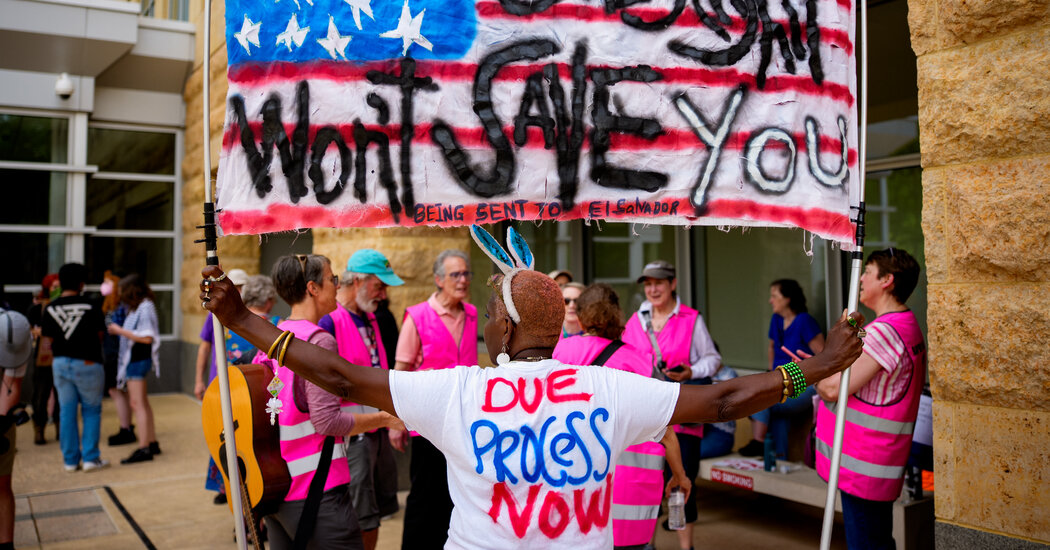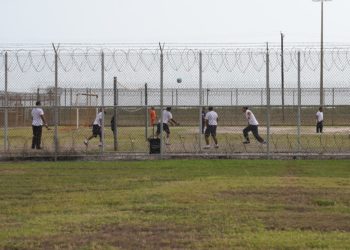A federal judge in Boston pressed the Trump administration on Tuesday for answers about whether the government deported migrants to South Sudan without due process, a move he said would violate an order he issued in April.
The stern remarks by the judge, Brian E. Murphy, came at a hastily called hearing in Federal District Court in Boston where immigration lawyers said at least two migrants had been told they were going to be deported to the violence-plagued country in Africa.
After a break in the proceedings to gather information, a lawyer for the Justice Department, Elianis N. Perez, said that one of the migrants, who is Burmese, was returned to Burma, not South Sudan. But she declined to say where the second migrant, a Vietnamese man, was deported, saying it was classified information.
“Where is the plane?” Judge Murphy asked.
“I’m told that that information is classified, and I am told that the final destination is also classified,” Ms. Perez said. She said the government had not violated any court orders because the man had not claimed to be fearful of removal.
Judge Murphy asked what authority the government was using to classify the location of the deportation flight. “I don’t have the answer to that,” she responded.
The judge warned that officials involved in the deportations who were aware of his order, including potentially the pilots of the plane, could face criminal sanctions. “Based on what I have been told,” he said, “this seems like it may be contempt.”
Earlier in the hearing, lawyers from the National Immigration Litigation Alliance and the Northwest Immigrant Rights Project had said they had been told Monday that a client of theirs, a Burmese man, was informed that he would be deported to South Sudan. When the lawyers checked on the man on Tuesday, they said, they were told that he had already been deported. Elsewhere, they said, a Vietnamese man “appears to have suffered the same fate.”
They said they wanted Judge Murphy to demand that the Trump administration return the migrants, given that they “will be or have been removed.” The lawyers included a pair of documents in the filing, including one Department of Homeland Security document that listed South Sudan as the place of removal for one of the immigrants.
“This morning, they learned from a detention officer via email that N.M.,” the migrant from Burma, “was removed this same morning to South Sudan,” the lawyers said.
In response to that claim, Judge Murphy said he believed it was likely a violation of his previous order issued in April, when he directed the Trump administration not to deport immigrants to countries other than their own without first giving them 15 days’ notice to raise concerns that they might face danger there.
On Friday evening, a federal appeals court that sits over Judge Murphy had rejected the Justice Department’s request to put his ruling on hold as the administration sought to challenge it.
During the hearing on Tuesday, Judge Murphy ordered Ms. Perez to notify everyone involved in the deportation flight — from the pilot of the plane to officials at the Department of Homeland Security — that they could face criminal contempt sanctions if his ruling was not followed. He also instructed Ms. Perez to find out exactly where the plane was and whether it could be turned around midflight.
It was not clear how many, if any, other migrants were on the plane or what their home countries were.
South Sudan, the world’s youngest country, has been torn by civil war and ethnic strife through most of its short history, and a tenuous peace now is on the verge of collapse. The State Department advises Americans not to travel there.
The Trump administration has increasingly turned to countries to take on migrants from places across the globe and not of their own. In the early months of the administration, officials have already deported migrants from the Eastern Hemisphere to Costa Rica and Panama, and have sent migrants from Venezuela to El Salvador under a wartime act.
“We are actively searching for other countries to take people from third countries,” Secretary of State Marco Rubio said in a cabinet meeting at the end of April. He said the United States had pushed the deals and asked countries whether they would take back nationals from other countries “as a favor to us.”
“And the further away from America, the better, so they can’t come back across the border,” he said.
Immigration lawyers have asked Judge Murphy several times to enforce his order on the Trump administration.
Last month, the lawyers claimed that four men were sent from a U.S. naval base in Cuba to El Salvador without proper notice. And earlier this month, they raised alarms to Judge Murphy that the administration was planning to deport a group of immigrants to Libya without sufficient notice.
Judge Murphy warned the government that the flight to Libya would have violated his order, as well.
“If there is any doubt — the court sees none — the allegedly imminent removals, as reported by news agencies and as plaintiffs seek to corroborate with class-member accounts and public information, would clearly violate this court’s order,” he wrote.
Over the weekend, the lawyers raised a new concern, saying that a Guatemalan man had been sent to Mexico without proper notice or a chance to express his fears about being sent there.
After initially claiming that the man had in fact been told that he was being flown to Mexico, the administration abruptly reversed itself, acknowledging that it could not find any officials who had in fact given the man the proper notice.
A hearing is scheduled in front of Judge Murphy on Wednesday to consider his claims.
Carol Rosenberg contributed reporting.
Hamed Aleaziz covers the Department of Homeland Security and immigration policy for The Times.
Alan Feuer covers extremism and political violence for The Times, focusing on the criminal cases involving the Jan. 6 attack on the Capitol and against former President Donald J. Trump.
The post Judge Presses Trump Administration About Reported Deportations to South Sudan appeared first on New York Times.




